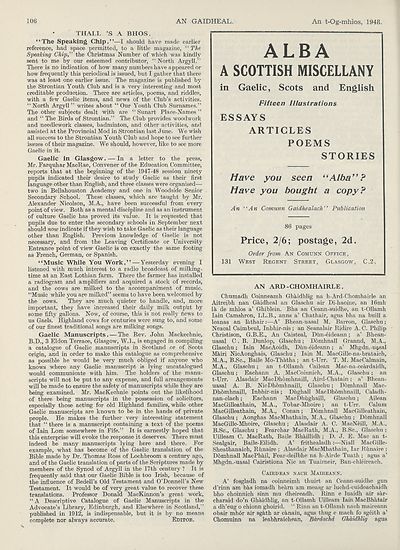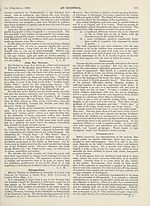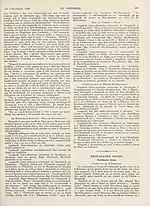An Comunn Gàidhealach Publications > Gaidheal > Volume 43, October 1947--December 1948
(114) Page 106
Download files
Complete book:
Individual page:
Thumbnail gallery: Grid view | List view

106
AN GAIDHEAL.
An t-Og-mhios, 1948.
THALL ’S A BHOS.
“The Speaking Chip.’’—I should have made earlier
reference, had space permitted, to a little magazine, “ The
Speaking Chip,” the Christmas Number of which was kindly
sent to me by our esteemed contributor, “ North Argyll.”
There is no indication of how many numbers have appeared or
how frequently this periodical is issued, but I gather that there
was at least one earlier issue. The magazine is published by
the Strontian Youth Club and is a very interesting and most
creditable production. There are articles, poems, and riddles,
with a few Gaelic items, and news of the Club’s activities.
“ North Argyll ” writes about “ Our Youth Club Surnames.”
The other subjects dealt with are “ Sunart Place-Names ”
and “ The Birds of Strontian.” The Club provides woodwork
and needlework classes, badminton, and other activities, and
assisted at the Provincial Mod in Strontian last June. We wish
all success to the Strontian Youth Club and hope to see further
issues of their magazine. We should, however, like to see more
Gaelic in it.
Gaelic in Glasgow. — In a letter to the press,
Mr. Farquhar MacRae, Convener of the Education Committee,
reports that at the beginning of the 1947-48 session ninety
pupils indicated their desire to study Gaelic as their first
language other than English, and three classes were organised—
two in Bellahouston Academy and one in Woodside Senior .
Secondary School. These classes, which are taught by Mr.
Alexander Nicolson, M.A., have been successful from every
point of view. Both as a mental discipline and as an instrument
of culture Gaelic has proved its value. It is requested that
pupils due to enter the secondary schools in September next
should now indicate if they wish to take Gaelic as their language
other than English. Previous knowledge of Gaelic is not
necessary, and from the Leaving Certificate or University
Entrance point of view Gaelic is on exactly the same footing
as French, German, or Spanish.
“Music While You Work.”—Yesterday evening I
listened with much interest to a radio broadcast of milking¬
time at an East Lothian farm. There the farmer has installed
a radiogram and amplifiers and acquired a stock of records,
and the cows are milked to the accompaniment of music.
“Music while you are milked” seems to have been welcomed by
the cows. They are much quieter to handle, and, more
important, they have increased their daily milk output by
some fifty gallons. Now, of course, this is not really flews to
us Gaels. Highland cows for centuries were sung to, and some
of our finest traditional songs are milking songs.
Gaelic Manuscripts. — The Rev. John Mackechnie,
B.D., 3 Eldon Terrace, Glasgow, W.I., is engaged in compiling
a catalogue of Gaelic manuscripts in Scotland or of Scots
origin, and in order to make this catalogue as comprehensive
as possible he would be very much obliged if anyone who
knows where any Gaelic manuscript is lying uncatalogued
would communicate with him. The holders of the manu¬
scripts will not be put to any expense, and full arrangements
will be made to ensure the safety of manuscripts while they are
being examined. Mr. MacKechnie points out the likelihood
of there being manuscripts in the possession of solicitors,
especially those acting for old Highland families, while other
Gaelic manuscripts are known to be in the hands of private
people. He makes the further very interesting statement
that “there is a manuscript containing a text of the poems
of Iain Lorn somewhere in Fife.” It is earnestly hoped that
this enterprise will evoke the response it deserves. There must
indeed be many manuscripts lying here and there. For
example, what has become of the Gaelic translation of the
Bible made by Dr. Thomas Ross of Lochbroom a century ago,
and of the Gaelic translation of parts of the Scriptures made by
members of the Synod of Argyll in the 17th century ? It is
frequently said that our Gaelic Bible is too Irish, because of
the influence of Bedell’s Old Testament and O’Donnell’s New
Testament. It would be of very great value to recover these
translations. Professor Donald MacKinnon’s great work,
“ A Descriptive Catalogue of Gaelic Manuscripts in the
Advocate’s Library, Edinburgh, and Elsewhere in Scotland,”
published in 1912, is indispensable, but it is by no means
complete nor always accurate. Editor.
ALBA
A SCOTTISH MISCELLANY
in Gaelic, Scots and English
Fifteen Illustrations
ESSAYS
ARTICLES
POEMS
STORIES
Have you seen “Alba”?
Have you bought a copy?
An “An Comunn Gaidhealach'’ Publication
Price, 2/6; postage, 2d.
Order from An Comunn Office,
131 West Regent Street, Glasgow, C.2.
AN ARD-CHOMHAIRLE.
Chumadh Coinneamh Ghaidhlig na h-Ard-Chomhairle an
Aitreibh nan Gkidheal an Glaschu air Di-haoine, an 16mh
Ik de mhlos a’ Ghiblein. Bha an Ceann-suidhe, an t-Ollamh
Iain Camshron, LL.B., anns a’ Chathair, agus bha na buill a
leanas an lathair:—A’ Bhean-uasal M. Barron, Glaschu;
Neacal Caimbeul, Inbhir-nis ; an Seanalair Ridire A. C. Philip
Christison, G.B.E., An Caisteal, Dim-eideann; a’ Bhean-
uasal C. B. Dunlop, Glaschu; Domhnall Grannd, M.A.,
Glaschu; Iain MacAoidh, Dim-eideann; a’ Mhgdn.-u^sal
Mkiri NicAonghais, Glaschu; Iain M. MacGille-na-brataich,
M.A., B.Sc., Baile Mo-Thatha ; an t-Urr. T. M. MacCalmain,
M.A., Glaschu; an t-Ollamh Cailean Mac-na-ceardaidh,
Glaschu; Eachann A. MacCoinnich, M.A., Glaschu; an
t-Urr. Alasdair MacDhomhnaill, Aird-Chatain; a’ Bhean-
uasal A. B. NicDhomhnaill, Glaschu; Domhnall Mac-
Dhomhnaill, Inbhir-nis; Diighall MacDhdmhnaill, Caladh-
nan-clach; Eachann MacDhiighaill, Glaschu; Ailean
MacGilleathain, M.A., Tobar-Mhoire; an t-Urr. Calum
MacGilleathain, M.A., Conan; Dbmhnall MacGilleathain,
Glaschu ; Aonghas MacMhathain, M.A., Glaschu ; Dbmhnall
MacGille-Mhoire, Glaschu; Alasdair A. C. MacNkill, M.A.,
B.Sc., Glaschu; Fearchar MacRath, M.A., B.Sc., Glaschu ;
Uilleam C. MacRath, Baile Bhaillidh ; D. J. E. Mac an t-
Sealgair, Baile-Eilidh. A’ frithealadh:—Niall MacGille-
Sheathanaich, Riinaire ; Alasdair MacMhathain, lar Rvinaire :
Dbmhnall MacPhail, Fear-deilbhe na h-Airde Tuath ; agus a’
Mhgdn.-uasal Cairistiona Nie an Tuaimeir, Ban-chleireaeh.
Cairdean nach Maireann.
A’ fosgladh na coinneimh thuirt an Ceann-suidhe gun
d’rinn am bas iomadh beam am measg ar luchd-cuideachaidh
bho choinnich sinn mu dheireadh. Rinn e luaidh air sar-
charaid do’n Ghkidhlig, an t-Ollamh Uilleam Iain MacBhatair
a dh’eug o chionn ghoirid. “ Rinn an t-Ollamh nach maireann
obair mh6r air sgath ar cknain, agus thug e mach fo sgeith a’
Chomuinn na leabhraichean, Bcirdachd Ghaidhlig agus
AN GAIDHEAL.
An t-Og-mhios, 1948.
THALL ’S A BHOS.
“The Speaking Chip.’’—I should have made earlier
reference, had space permitted, to a little magazine, “ The
Speaking Chip,” the Christmas Number of which was kindly
sent to me by our esteemed contributor, “ North Argyll.”
There is no indication of how many numbers have appeared or
how frequently this periodical is issued, but I gather that there
was at least one earlier issue. The magazine is published by
the Strontian Youth Club and is a very interesting and most
creditable production. There are articles, poems, and riddles,
with a few Gaelic items, and news of the Club’s activities.
“ North Argyll ” writes about “ Our Youth Club Surnames.”
The other subjects dealt with are “ Sunart Place-Names ”
and “ The Birds of Strontian.” The Club provides woodwork
and needlework classes, badminton, and other activities, and
assisted at the Provincial Mod in Strontian last June. We wish
all success to the Strontian Youth Club and hope to see further
issues of their magazine. We should, however, like to see more
Gaelic in it.
Gaelic in Glasgow. — In a letter to the press,
Mr. Farquhar MacRae, Convener of the Education Committee,
reports that at the beginning of the 1947-48 session ninety
pupils indicated their desire to study Gaelic as their first
language other than English, and three classes were organised—
two in Bellahouston Academy and one in Woodside Senior .
Secondary School. These classes, which are taught by Mr.
Alexander Nicolson, M.A., have been successful from every
point of view. Both as a mental discipline and as an instrument
of culture Gaelic has proved its value. It is requested that
pupils due to enter the secondary schools in September next
should now indicate if they wish to take Gaelic as their language
other than English. Previous knowledge of Gaelic is not
necessary, and from the Leaving Certificate or University
Entrance point of view Gaelic is on exactly the same footing
as French, German, or Spanish.
“Music While You Work.”—Yesterday evening I
listened with much interest to a radio broadcast of milking¬
time at an East Lothian farm. There the farmer has installed
a radiogram and amplifiers and acquired a stock of records,
and the cows are milked to the accompaniment of music.
“Music while you are milked” seems to have been welcomed by
the cows. They are much quieter to handle, and, more
important, they have increased their daily milk output by
some fifty gallons. Now, of course, this is not really flews to
us Gaels. Highland cows for centuries were sung to, and some
of our finest traditional songs are milking songs.
Gaelic Manuscripts. — The Rev. John Mackechnie,
B.D., 3 Eldon Terrace, Glasgow, W.I., is engaged in compiling
a catalogue of Gaelic manuscripts in Scotland or of Scots
origin, and in order to make this catalogue as comprehensive
as possible he would be very much obliged if anyone who
knows where any Gaelic manuscript is lying uncatalogued
would communicate with him. The holders of the manu¬
scripts will not be put to any expense, and full arrangements
will be made to ensure the safety of manuscripts while they are
being examined. Mr. MacKechnie points out the likelihood
of there being manuscripts in the possession of solicitors,
especially those acting for old Highland families, while other
Gaelic manuscripts are known to be in the hands of private
people. He makes the further very interesting statement
that “there is a manuscript containing a text of the poems
of Iain Lorn somewhere in Fife.” It is earnestly hoped that
this enterprise will evoke the response it deserves. There must
indeed be many manuscripts lying here and there. For
example, what has become of the Gaelic translation of the
Bible made by Dr. Thomas Ross of Lochbroom a century ago,
and of the Gaelic translation of parts of the Scriptures made by
members of the Synod of Argyll in the 17th century ? It is
frequently said that our Gaelic Bible is too Irish, because of
the influence of Bedell’s Old Testament and O’Donnell’s New
Testament. It would be of very great value to recover these
translations. Professor Donald MacKinnon’s great work,
“ A Descriptive Catalogue of Gaelic Manuscripts in the
Advocate’s Library, Edinburgh, and Elsewhere in Scotland,”
published in 1912, is indispensable, but it is by no means
complete nor always accurate. Editor.
ALBA
A SCOTTISH MISCELLANY
in Gaelic, Scots and English
Fifteen Illustrations
ESSAYS
ARTICLES
POEMS
STORIES
Have you seen “Alba”?
Have you bought a copy?
An “An Comunn Gaidhealach'’ Publication
Price, 2/6; postage, 2d.
Order from An Comunn Office,
131 West Regent Street, Glasgow, C.2.
AN ARD-CHOMHAIRLE.
Chumadh Coinneamh Ghaidhlig na h-Ard-Chomhairle an
Aitreibh nan Gkidheal an Glaschu air Di-haoine, an 16mh
Ik de mhlos a’ Ghiblein. Bha an Ceann-suidhe, an t-Ollamh
Iain Camshron, LL.B., anns a’ Chathair, agus bha na buill a
leanas an lathair:—A’ Bhean-uasal M. Barron, Glaschu;
Neacal Caimbeul, Inbhir-nis ; an Seanalair Ridire A. C. Philip
Christison, G.B.E., An Caisteal, Dim-eideann; a’ Bhean-
uasal C. B. Dunlop, Glaschu; Domhnall Grannd, M.A.,
Glaschu; Iain MacAoidh, Dim-eideann; a’ Mhgdn.-u^sal
Mkiri NicAonghais, Glaschu; Iain M. MacGille-na-brataich,
M.A., B.Sc., Baile Mo-Thatha ; an t-Urr. T. M. MacCalmain,
M.A., Glaschu; an t-Ollamh Cailean Mac-na-ceardaidh,
Glaschu; Eachann A. MacCoinnich, M.A., Glaschu; an
t-Urr. Alasdair MacDhomhnaill, Aird-Chatain; a’ Bhean-
uasal A. B. NicDhomhnaill, Glaschu; Domhnall Mac-
Dhomhnaill, Inbhir-nis; Diighall MacDhdmhnaill, Caladh-
nan-clach; Eachann MacDhiighaill, Glaschu; Ailean
MacGilleathain, M.A., Tobar-Mhoire; an t-Urr. Calum
MacGilleathain, M.A., Conan; Dbmhnall MacGilleathain,
Glaschu ; Aonghas MacMhathain, M.A., Glaschu ; Dbmhnall
MacGille-Mhoire, Glaschu; Alasdair A. C. MacNkill, M.A.,
B.Sc., Glaschu; Fearchar MacRath, M.A., B.Sc., Glaschu ;
Uilleam C. MacRath, Baile Bhaillidh ; D. J. E. Mac an t-
Sealgair, Baile-Eilidh. A’ frithealadh:—Niall MacGille-
Sheathanaich, Riinaire ; Alasdair MacMhathain, lar Rvinaire :
Dbmhnall MacPhail, Fear-deilbhe na h-Airde Tuath ; agus a’
Mhgdn.-uasal Cairistiona Nie an Tuaimeir, Ban-chleireaeh.
Cairdean nach Maireann.
A’ fosgladh na coinneimh thuirt an Ceann-suidhe gun
d’rinn am bas iomadh beam am measg ar luchd-cuideachaidh
bho choinnich sinn mu dheireadh. Rinn e luaidh air sar-
charaid do’n Ghkidhlig, an t-Ollamh Uilleam Iain MacBhatair
a dh’eug o chionn ghoirid. “ Rinn an t-Ollamh nach maireann
obair mh6r air sgath ar cknain, agus thug e mach fo sgeith a’
Chomuinn na leabhraichean, Bcirdachd Ghaidhlig agus
Set display mode to:
![]() Universal Viewer |
Universal Viewer | ![]() Mirador |
Large image | Transcription
Mirador |
Large image | Transcription
| An Comunn Gàidhealach > An Comunn Gàidhealach Publications > Gaidheal > Volume 43, October 1947--December 1948 > (114) Page 106 |
|---|
| Permanent URL | https://digital.nls.uk/125252640 |
|---|
| Description | This contains items published by An Comunn, which are not specifically Mòd-related. It includes journals, annual reports and corporate documents, policy statements, educational resources and published plays and literature. It is arranged alphabetically by title. |
|---|
| Description | A collection of over 400 items published by An Comunn Gàidhealach, the organisation which promotes Gaelic language and culture and organises the Royal National Mòd. Dating from 1891 up to the present day, the collection includes journals and newspapers, annual reports, educational materials, national Mòd programmes, published Mòd literature and music. |
|---|---|
| Additional NLS resources: |
|

